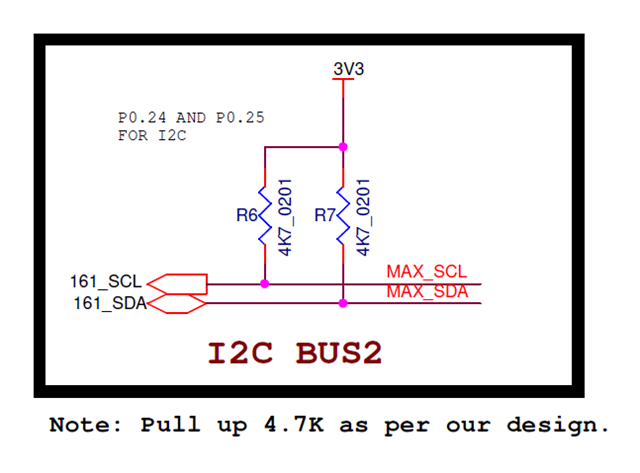I have tried all the configs on device tree to make the sensor work reliably, but it fails. Like I have LSM6DSOX as IMU and it works for sometime and then On power on reset , device starts to show as not ready
Providing config files and schematic of the SDA and SCL line-
&i2c0 {
lsm6dsox: lsm6dsox@6A {
compatible = "st,lsm6dso";
reg = <0x6A>;
};
stc3117: stc3117@70 {
compatible = "i2c-device";
reg = <0x70>;
};
mlx60732: mlx60732@3A {
compatible = "i2c-device";
reg = <0x3A>;
};
};
&i2c1 {
status = "okay";
maxm86161: maxm86161@62 {
compatible = "i2c-device";
reg = <0x62>;
};
};

And this is pin ctrl config for the same -
/*
* Copyright (c) 2022 Nordic Semiconductor
* SPDX-License-Identifier: Apache-2.0
*/
&pinctrl {
uart0_default: uart0_default {
group1 {
psels = <NRF_PSEL(UART_TX, 0, 6)>,
<NRF_PSEL(UART_RTS, 0, 5)>;
};
group2 {
psels = <NRF_PSEL(UART_RX, 0, 8)>,
<NRF_PSEL(UART_CTS, 0, 7)>;
bias-pull-up;
};
};
uart0_sleep: uart0_sleep {
group1 {
psels = <NRF_PSEL(UART_TX, 0, 6)>,
<NRF_PSEL(UART_RX, 0, 8)>,
<NRF_PSEL(UART_RTS, 0, 5)>,
<NRF_PSEL(UART_CTS, 0, 7)>;
low-power-enable;
};
};
uart1_default: uart1_default {
group1 {
psels = <NRF_PSEL(UART_RX, 1, 1)>;
bias-pull-up;
};
group2 {
psels = <NRF_PSEL(UART_TX, 1, 2)>;
};
};
uart1_sleep: uart1_sleep {
group1 {
psels = <NRF_PSEL(UART_RX, 1, 1)>,
<NRF_PSEL(UART_TX, 1, 2)>;
low-power-enable;
};
};
i2c0_default: i2c0_default {
group1 {
psels = <NRF_PSEL(TWIM_SDA, 0, 27)>,
<NRF_PSEL(TWIM_SCL, 0, 26)>;
bias-disable;
};
};
i2c0_sleep: i2c0_sleep {
group1 {
psels = <NRF_PSEL(TWIM_SDA, 0, 27)>,
<NRF_PSEL(TWIM_SCL, 0, 26)>;
bias-disable;
low-power-enable;
};
};
i2c1_default: i2c1_default {
group1 {
psels = <NRF_PSEL(TWIM_SDA, 0, 25)>,
<NRF_PSEL(TWIM_SCL, 0, 24)>;
bias-disable;
};
};
i2c1_sleep: i2c1_sleep {
group1 {
psels = <NRF_PSEL(TWIM_SDA, 0, 25)>,
<NRF_PSEL(TWIM_SCL, 0, 24)>;
bias-disable;
low-power-enable;
};
};
pwm0_default: pwm0_default {
group1 {
psels = <NRF_PSEL(PWM_OUT0, 0, 13)>;
nordic,invert;
};
};
pwm0_sleep: pwm0_sleep {
group1 {
psels = <NRF_PSEL(PWM_OUT0, 0, 13)>;
low-power-enable;
};
};
spi0_default: spi0_default {
group1 {
psels = <NRF_PSEL(SPIM_SCK, 0, 27)>,
<NRF_PSEL(SPIM_MOSI, 0, 26)>,
<NRF_PSEL(SPIM_MISO, 0, 29)>;
};
};
spi0_sleep: spi0_sleep {
group1 {
psels = <NRF_PSEL(SPIM_SCK, 0, 27)>,
<NRF_PSEL(SPIM_MOSI, 0, 26)>,
<NRF_PSEL(SPIM_MISO, 0, 29)>;
low-power-enable;
};
};
spi1_default: spi1_default {
group1 {
psels = <NRF_PSEL(SPIM_SCK, 0, 31)>,
<NRF_PSEL(SPIM_MOSI, 0, 30)>,
<NRF_PSEL(SPIM_MISO, 1, 8)>;
};
};
spi1_sleep: spi1_sleep {
group1 {
psels = <NRF_PSEL(SPIM_SCK, 0, 31)>,
<NRF_PSEL(SPIM_MOSI, 0, 30)>,
<NRF_PSEL(SPIM_MISO, 1, 8)>;
low-power-enable;
};
};
spi2_default: spi2_default {
group1 {
psels = <NRF_PSEL(SPIM_SCK, 0, 19)>,
<NRF_PSEL(SPIM_MOSI, 0, 20)>,
<NRF_PSEL(SPIM_MISO, 0, 21)>;
};
};
spi2_sleep: spi2_sleep {
group1 {
psels = <NRF_PSEL(SPIM_SCK, 0, 19)>,
<NRF_PSEL(SPIM_MOSI, 0, 20)>,
<NRF_PSEL(SPIM_MISO, 0, 21)>;
low-power-enable;
};
};
qspi_default: qspi_default {
group1 {
psels = <NRF_PSEL(QSPI_SCK, 0, 19)>,
<NRF_PSEL(QSPI_IO0, 0, 20)>,
<NRF_PSEL(QSPI_IO1, 0, 21)>,
<NRF_PSEL(QSPI_IO2, 0, 22)>,
<NRF_PSEL(QSPI_IO3, 0, 23)>,
<NRF_PSEL(QSPI_CSN, 0, 17)>;
};
};
qspi_sleep: qspi_sleep {
group1 {
psels = <NRF_PSEL(QSPI_SCK, 0, 19)>,
<NRF_PSEL(QSPI_IO0, 0, 20)>,
<NRF_PSEL(QSPI_IO1, 0, 21)>,
<NRF_PSEL(QSPI_IO2, 0, 22)>,
<NRF_PSEL(QSPI_IO3, 0, 23)>;
low-power-enable;
};
group2 {
psels = <NRF_PSEL(QSPI_CSN, 0, 17)>;
low-power-enable;
bias-pull-up;
};
};
spi3_default: spi3_default {
group1 {
psels = <NRF_PSEL(SPIM_SCK, 1, 15)>,
<NRF_PSEL(SPIM_MISO, 1, 14)>,
<NRF_PSEL(SPIM_MOSI, 1, 13)>;
};
};
spi3_sleep: spi3_sleep {
group1 {
psels = <NRF_PSEL(SPIM_SCK, 1, 15)>,
<NRF_PSEL(SPIM_MISO, 1, 14)>,
<NRF_PSEL(SPIM_MOSI, 1, 13)>;
low-power-enable;
};
};
};
Strangely there is one more sensor on the same line and that sensor is working properly with this configuration. I have been using the same sensor and same hardware which was working on nrf5 SDK and recently ported the project to NCS 2.2.0.
Please help in resolving this


